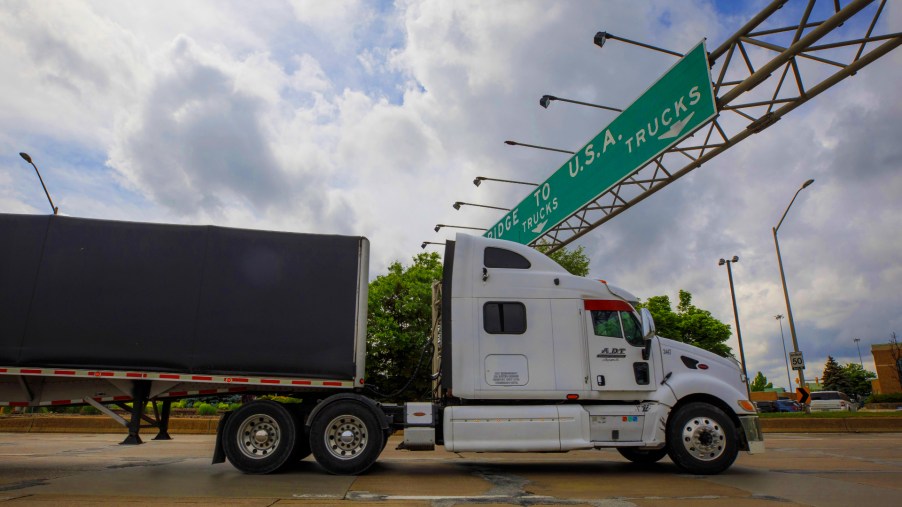
Are Hydrogen Fuel Cells Taking over the Trucking Industry?
The automotive industry has officially entered the alternative energy era. Some consumers will join begrudgingly, but eventually, all new vehicles will be electric vehicles. The revolution is here. Why else would Ford put out an electric truck? Things are changing, and not just for personal vehicles either. The trucking industry is experiencing a major shift as well.
Trucking is about to get safer

Truckers are responsible for just about everything consumers can think of being delivered to their favorite shops and stores. If you buy it at a store, there’s a huge chance it came from a truck, especially big retailers. Trucking has provided stable jobs for millions in the U.S. alone. Unfortunately, diesel-fueled semi-trucks aren’t doing great things for the environment.
Until someone invents a safe teleportation device, the trucking industry will be around for a long time. This presents a huge problem for the environment but never fear. Automakers are getting to work on several alternative energy options to prevent the trucking industry from being one of the biggest causes of pollution. Thanks to new technology, we soon won’t have to feel bad about our next-day-delivery online purchases.
How do hydrogen fuel cells work?

So first, what on earth is a hydrogen fuel cell, and why are so many automakers suddenly incorporating it in their vehicles? Most modern vehicles use internal combustion engines. These engines burn fuel (mostly petroleum liquids and crude oil). This fuel-burning process creates heat inside the engine that moves the pistons at a rapid pace to drive the wheels and transmission.
Battery-powered electric vehicles aren’t the only type of electric vehicle. Battery-powered EVs are powered by electric motors and can be charged at various charging stations. Hydrogen fuel cells use a different type of technology to power vehicles. These vehicles actually produce electricity rather than consuming it.
Hydrogen fuel cells produce power by using fuel from a tank similar to an internal combustion engine. The big difference is the hydrogen fuel cell vehicles don’t actually burn anything. Hydrogen fuel cell-powered vehicles use hydrogen to produce electricity to drive the vehicle chemically. The big difference between battery electric vehicles (BEVs) and fuel cell electric vehicles (FCEVs) is the way they refuel.
Hydrogen fuel cell vehicles Vs. battery electric vehicles

BEVs are becoming more common across the globe. Companies like Tesla have popularized BEVs, and they only seem to be increasing in demand. However, there is one huge advantage that FCEVs have over BEVs. It has to do with one of the biggest BEV pitfalls: charging time.
Charging a BEV can take hours. To achieve a full charge, drivers have to sit their vehicle at the electric charger for an extremely long time compared to the time it takes to refuel a vehicle with an internal combustion engine. Tesla has a supercharger network, but the superchargers are not currently compatible with most other vehicle brands.
Hydrogen fuel cells and the trucking industry

So, what does this all have to do with the trucking industry? The end of internal combustion engines is near, and semi-trucks will need a fuel source to replace diesel. Semi-trucks powered by electric batteries are completely impractical at the moment because the charging technology isn’t up to par yet.
Truck drivers don’t have hours to refuel. They need to get back on the road quickly and usually travel long distances on a tight schedule. Hydrogen fuel cells are here to save the day. FCEVs can be refueled just like regular old gas-powered vehicles because hydrogen is their main fuel source. Hydrogen can be pumped into a vehicle’s tank just like gas, and a FCEV can be ready to roll within minutes.
According to MOTOR, over 800,000 commercial trucks powered by hydrogen fuel cells will be sold by 2035. Faster fueling and higher range are the main reasons hydrogen fuel cell commercial trucks are favored over trucks with electric batteries. Hydrogen fuel cell trucks are expensive, and more hydrogen fueling stations must be built, but they are the superior EV for long hauling. Hydrogen fuel cells are about to change the trucking industry forever.



